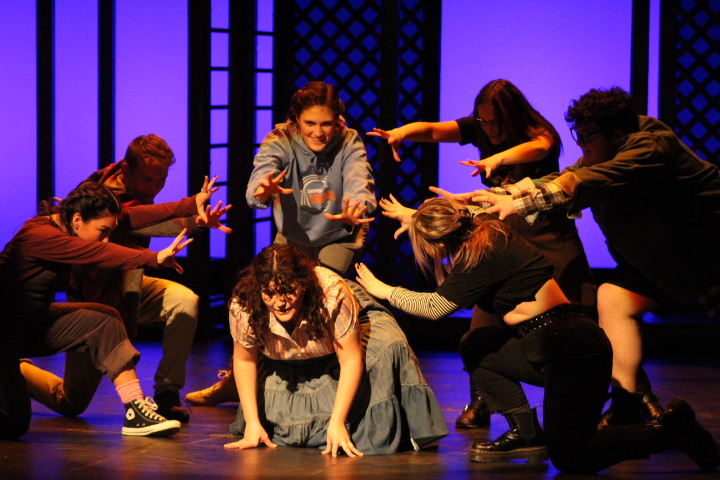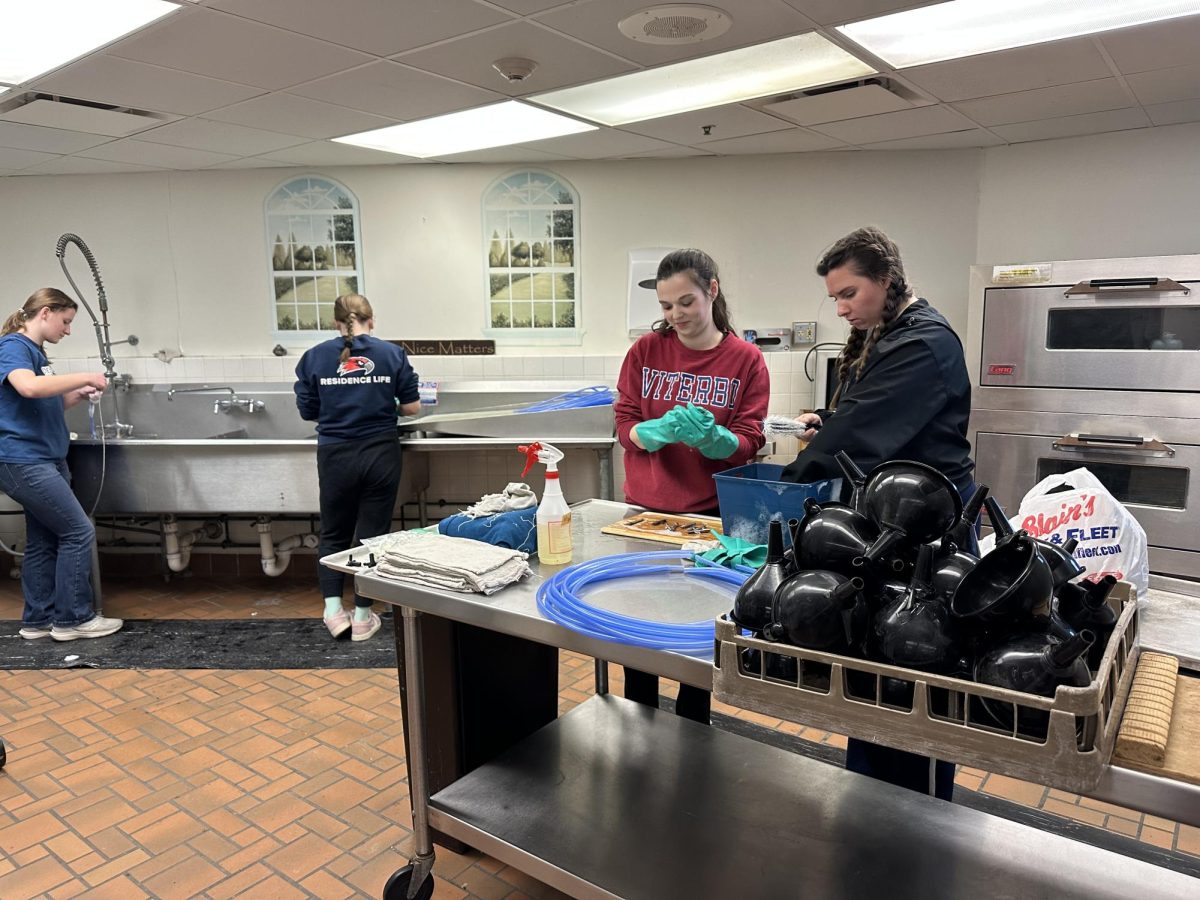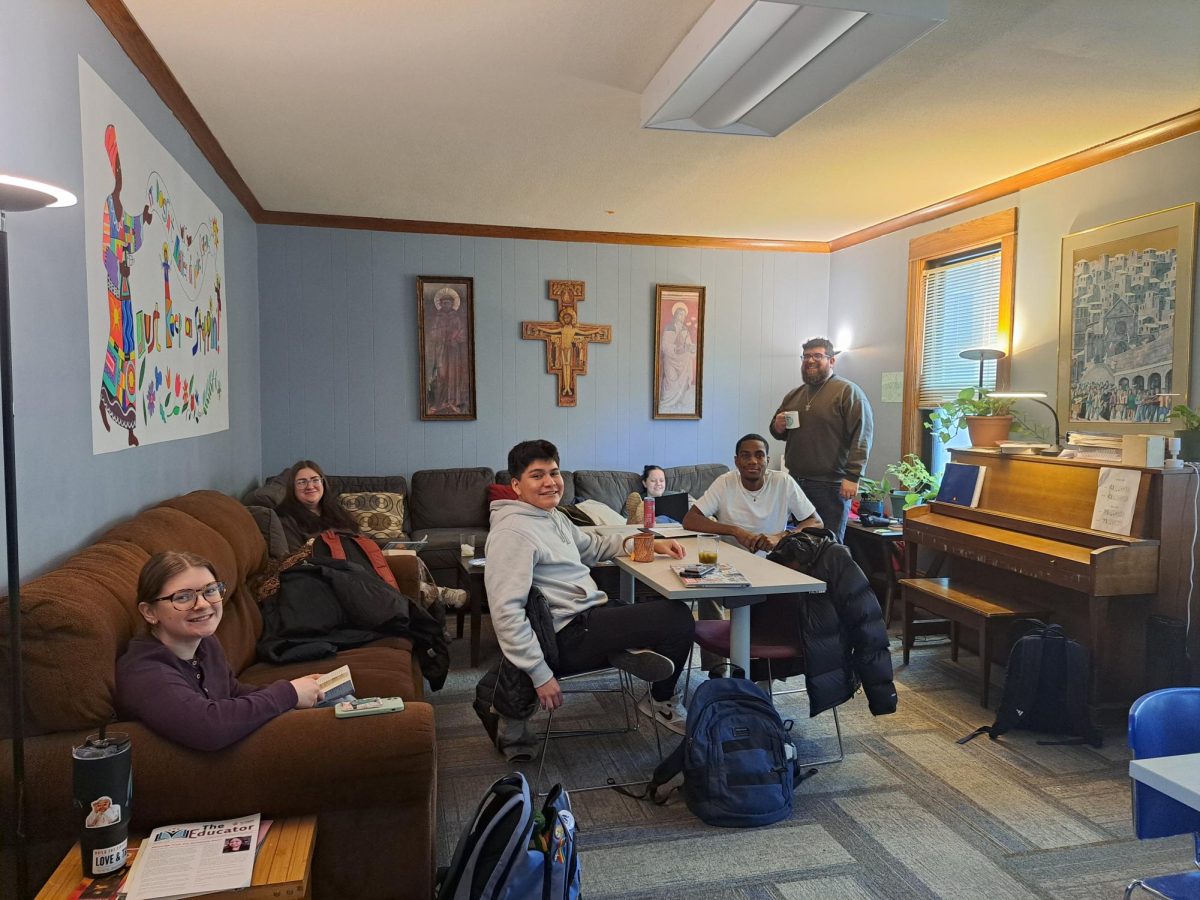Carrie: The Musical begs audiences to consider, “What does it cost to be kind?”
Kaylyn Schmit as Carrie White
March 7, 2022
Fake blood, flashing lights, and mass destruction were all elements that made the Viterbo Conservatory for the Performing Arts’ production of “Carrie: The Musical” thrilling to spectate. All the fun effects aside, the show presents opportunity for conversations about lofty topics such as bullying, suicide, and being kind to one another.
March 4, 2022, “Carrie: The Musical” rose its curtain at the Weber Center before its first live audience. It follows the story of Carrie White, abused by her brainwashed mother, bullied, and ostracized by her classmates, and troubled by a darkness, which is revealed through her telekinetic, supernatural, powers. Before the show premiered, months of preparation was necessary to make the show possible. For Kalyn Schmit, who played the infamous title-character, Carrie White, this process started with “research, research, research!”
“I got the book for Christmas, read it, re-read it, and annotated it,” Schmit began, “I probably re-read it like three times, four, five times? I even figured out her astrology chart because [the book] has her full birthdate, time, and location listed. In case you’re curious, Virgo sun, Scorpio moon, and Scorpio rising.” It is fair to say Schmit’s work was extensive in bringing Carrie to life; but Schmit said it was a dream come true.
“It has been a dream show, dream role, of mine for several years,” Schmit admitted. Because of this, she said memorization was a sinch; what she was not prepared for, however, was the emotional toll an actor sometimes pays to make their art. “I have actually started going to therapy because of the role,” said Schmit, I connect so deeply with [Carrie] and as we were staging the prom, getting onto that platform—even though I know it’s not real, at all—I still felt a pit in my stomach.”
Schmit credits “Carrie’s” director, Teddy Eck, and assistant director/stage manager, Mads Magson, for providing a safe environment and meeting all the cast’s needs. “I feel safe with this group and that’s an important thing to feel,” Schmit explained, I also could not have gotten through this show mentally without the constant reassurance and love from the cast. I am so grateful for them.”
In addition to Schmit’s powerful performance was the show’s massive two-story set pieces, designed by Yuri Okahana-Benson, light design, by Erik Voser, and projections, by Grant Barclay. All this, in conjunction with practical effects to showcase Carrie’s telekinesis, had some company members, like Margaret White actor, Rachel Ponder, a little skeptical as to if everything was gonna fit together at the beginning of the process.” Ponder admitted that, before long, those suspicions were happily dismissed.
“This is probably the biggest show I will do at Viterbo given the number of special effects,” stated Magson, “There are also 385 light cues in addition to sounds, and projections.” Despite all these things going on at once, she said, “I think calling the show is the most fun part of it. It can be anxiety inducing, [the show] does ride on your shoulders, but it does have a fun payoff to be like, ‘okay, I’m in charge, [the show] goes when I say it goes, and it looks awesome.”
For Magson, calling the show was not what she originally signed up for. “I started this experience in the audition room knowing that I was going to be the assistant director,” stated Magson, “Our stage manager had to step away due to personal reasons… five days before rehearsals began Teddy asked me if I could do it, as I had been a stage manager before, and of course I said ‘yes!’”
Magson declared all the additional paperwork, emails, and late nights worth it as she was able to “play a big part of the artistic vision.” “I got to see how Teddy saw things, how he wanted things to come together,” Magson reflected. “It is interesting how a young mind, like mine, relates to one that is filled with so much experience. I definitely want to try this more in the near future.”
Like Schmit, Magson also found Carrie’s story valuable, not only to her, but for our society today. “What does it cost to be kind? It costs nothing,” Magson concluded. “I think that is a message that we should always remember. Because, as a victim of bullying myself, it’s important to make sure that behavior doesn’t grow as our generations grow.”



